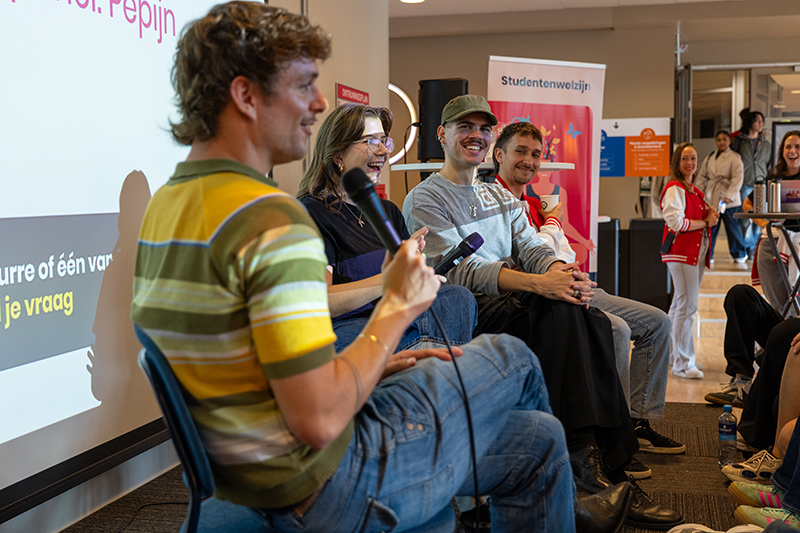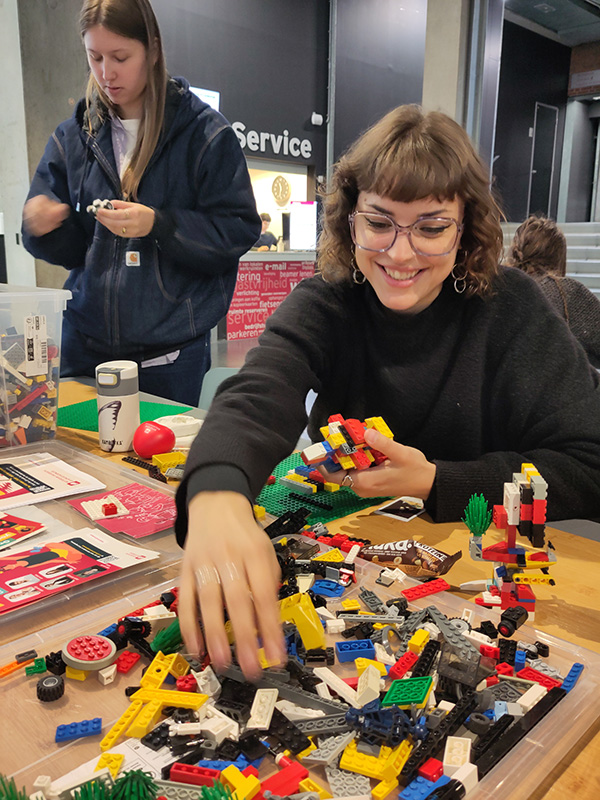Why organise a Student Wellbeing Week?
Everyone has a role to play in student wellbeing. Alongside academic success, it forms the basis of one of our strategic goals: Student Success. The aim of Student Wellbeing Week is to raise awareness of student wellbeing, equip students and staff with the necessary skills, and encourage them to take control of their own wellbeing. After all, students who feel good about themselves will learn better, grow stronger, and learn to navigate a rapidly changing world with confidence.
A week full of inspiration
The week offered a varied programme of talks by inspiring speakers on themes such as self-love, loneliness, inner peace, stress and performance pressure.
Lotte van Eijk, a former Willem de Kooning Academy (WdKA) student, gave a tour of the academy and shared her thoughts on self-love, “If you show yourself fully to the world, you will attract people like you.”
Jurre Geluk, a presenter and programme maker at BNNVARA, spoke openly and honestly at the Museumpark location about mental health, performance pressure and social engagement. He gave students the following advice, “Be kind to yourself. There is a lot going on in the world. You are studying, which is hard enough, so make sure you take time to recharge. For example, set aside an hour to do something for yourself. Also, plan to socialise with a friend or family member once a week — it can be anyone. It will make you feel better.”

Tip for lecturers: small gestures, big impact
During the panel discussion at Jurre Geluk's lecture, teachers talked about student support. Student Lisanne said, “As a teacher, you can make a big difference by being visible and showing openness. By mentioning that you are available during or after class, you allow students a time to show some vulnerability. Not everyone is immediately open to this, but by creating small moments of attention, you create space for vulnerability and connection.”
Stress and the brain
At Museumpark, neurobiologist Brankele Frank gave a fascinating lecture on how stress works in the brain. She also offered advice on how to reduce stress. During the meeting, a student asked, “Why do young people today experience more burnout symptoms than older generations?” Brankele Frank replied, “Because society looks drastically different than it did thirty years ago. Things like smartphones, information technology and the housing crisis have made life much more complicated for young people. Young people experience more stress than older people. Should they pursue a career or start a family? There are many choices to be made. That causes stress.”
Brankele Frank offered practical tips, such as walking, taking an afternoon nap and doodling, to help students remember the material better before an exam.
Inner peace
At the Kralingse Zoom location, Jasper Demollin — known for his appearances on Streetlab and The FOMO Show — shared his candid story about depression and loneliness, and explained how spirituality had helped him to lead a stronger, happier life. According to Jasper, true happiness does not lie in success, work, fame or money, but in a pure connection with yourself. After a long search, he found peace, gratitude and inner tranquillity through meditation, among other things. Jasper Demollin said, “I do not find happiness is the physical world. I find it in energy and through meditation, which bring me back to who I really am. It is the best feeling ever.”
During a live meditation session, students and colleagues had the opportunity to experience this for themselves.
Mindful Lego
As well as lectures and discussions, there was plenty of opportunity for creativity and relaxation. The week was full of surprising workshops, from boxing therapy and graffiti to mindful Lego and classical music. The Student Wellbeing Week ended with a festive Caribbean party. You could learn to dance during a workshop, but most importantly, you could relax and have fun.

Want to find out more?
Rotterdam University of Applied Sciences offers a diverse and wide range of services in the field of wellbeing: check it out on our study support page. The entire programme of the Student Wellbeing Week can be found here.
You will soon be able to listen to the interviews with the speakers. Keep an eye out for the Student Wellbeing Week podcasts.
Do you have any questions? Please contact the Student Wellbeing Team.
